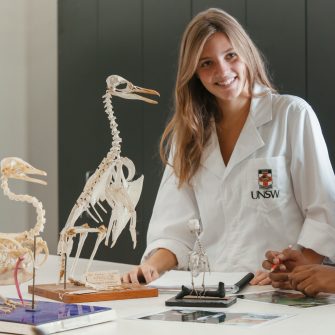Bachelor of Advanced Science (Honours)/Computer Science
- Commencing Terms
- Term 1, 2 & 3
- Duration
- 5 Year(s)
- Delivery Mode
- Face-to-face (includes blended)
- Campus
-
Kensington
- Codes
- UAC code 429361
- Program code 3782
-
2025 Indicative first year full fee
- $8,000*
-
2025 Indicative full fee to complete degree
- $46,500*
-
2025 Indicative first year full fee
- $58,500*
-
2025 Indicative full fee to complete degree
- $323,500*

- Overview
- Entry requirements
- What will I study?
- Future careers
- How to apply
- Fees & Scholarships
Overview
Take your passion and potential to new heights with an advanced double degree at a global top 20 university (QS World University Rankings, 2025). You’ll benefit from hands-on learning experiences, cutting-edge facilities and learn from world-leading academics to prepare you for the jobs of tomorrow.
In the Advanced Science (Honours) degree, you’ll gain strong foundational knowledge across key scientific fields with advanced-level subjects to challenge you academically. You’ll choose from 24 majors, including biology and biodiversity, chemistry, genetics and advanced physics. Immersive research experiences and an embedded honours year will prepare you to enter the workforce as a leader in your field.
In Computer Science, you’ll study the design, construction and use of computer systems. You’ll also have the choice to study a general Computer Science degree or specialise in your chosen area.
By combining the Bachelor of Advanced Science (Honours) with a Bachelor of Science (Computer Science), you can gain a second degree in as little as one year additional study. This industry-aligned double degree helps you develop highly-sought after skills to open up a wider range of opportunities after graduation. With artificial intelligence and security engineering becoming increasingly embedded in our day-to-day lives, graduates with advanced knowledge in these areas will be invaluable assets to any organisation, government body or non-profit.
Key features
Carve out a career path based on your passions
At UNSW, you’ll be encouraged to explore the wide range of focus areas and career paths open to you.
This double degree allows you to carve out a unique skill set across the field of science, with a focus on computer-based science. As part of Advanced Science (Honours), you’ll choose from 24 majors to tailor your degree to your interests. Our flexible degree structure enables you to explore different disciplines in your first year to find the field that’s right for you. In the Computer Science degree, you’ll further refine your expertise with your choice of seven majors, from artificial intelligence to security engineering.
Whether you have your dream career in mind or you’re open to endless possibilities, we’ll help you build the degree that’s right for you.
Multiply your opportunities with a specialised double degree
Employers are always looking for candidates who stand out from the crowd. Graduating with a double degree demonstrates dedication and specialised expertise, giving you a competitive advantage in the job market.
Despite the name, a double degree doesn’t mean double the time or workload. By combining the Bachelor of Advanced Science (Honours) and Bachelor of Science (Computer Science) into a double degree, you’ll study focused courses in each program, allowing you to complete the two degrees faster^.
Explore your career possibilities through research and work integrated learning
Bridge the gap between study and employment with our Work Integrated Learning (WIL) and Research Integrated Learning (RIL) opportunities. These experiences allow you to explore different career paths and apply your skills professionally while being guided by world-leading academics.
During your studies, you’ll collaborate with students from a range of disciplines to tackle real-world problems in project-based learning initiatives. This multidisciplinary educational approach allows you to develop essential technical and professional skills, so you thrive in your future career.
Research courses are also fundamental to this double degree. You’ll engage with authentic scientific research from year one of your Advanced Science program and have the opportunity to complete a research internship under the guidance of one of UNSW Science’s leading academics.
Why study this degree at UNSW?
Want to see more from UNSW Science?
Entry requirements
Assumed knowledge
For Advanced Science (Hons) component: Mathematics Advanced or Mathematics Extension 1 (depending on chosen area of study) plus one or more of Biology, Chemistry, Earth and Environmental Science, Physics For Computer Science: Mathematics Extension 1
Adjustment Factors
We offer a range of adjustment factor schemes that reward students for academic performance and extra-curricular achievements. These schemes also take into account a range of personal and educational disadvantages that may have affected your studies.
HSC Plus
This scheme rewards students who perform well in Year 12 subjects that are relevant to their preferred UNSW degree. You may be awarded up to five points.
Elite Athletes, Performers and Leaders (EAPL)
This program recognises achievements in the areas of sport, academia, leadership and music at an elite level. You may be eligible for up to five points.
Educational Access Scheme (EAS), opens in a new window
Factors such as illness, financial hardship, language difficulties or attending a particular school can mean you don't always get the best possible marks in Years 11 and 12. If one of these situations applies to you, submit an application for the Educational Access Scheme (EAS) via UAC. Eligible students can receive between 1 and 10 points towards their chosen UNSW degree.
Admission pathways
Your ATAR is not the only measure of your potential to succeed, which is why we offer a range of pathways into university. Explore your options below and get in touch with our Future Student Advisers to discuss your path to UNSW.
Gateway Admission Pathway
This scheme is open to students who attend Gateway schools, live in a low-socioeconomic area based on IRSAD and IEO indexes of SEIFA criteria, or are an Aboriginal and Torres Strait Islander person. It adjusts the ATAR requirements for your preferred UNSW degree and provides early offers and early conditional offers to UNSW.
Entry programs for Australian Aboriginal and Torres Strait Islander people
We offer entry programs for Indigenous Australians, including the Indigenous Preparatory Programs and the Indigenous Admission Scheme (IAS). The entry pathway program you apply for will depend on the degree you want to study.
Progression requirements
Entry into the Honours program in Science is subject to academic performance and progression requirements. Students may exit the Advanced Science (Honours) program with a B Science award if they are unsuccessful in applying for entry into Honours.
English language requirements
You may be asked to provide evidence of your English proficiency to study at UNSW depending on your educational background and citizenship. English language skills are vitally important for coping with lectures, tutorials, assignments and examinations - this is why UNSW requires a minimum English language competency for enrolment.
If you’re completing an Australian Year 12 qualification (e.g. NSW HSC or equivalent), you do not need to provide anything extra to prove your proficiency. Your qualification will be used as evidence of your English proficiency.
If you do need to provide evidence of your English proficiency, this will be indicated in your application. You can prove this by providing evidence that you meet one or more of the following criteria:
- English language tests and university English courses
- Prior study in the medium of English
- Other qualifications
If you need to improve your English skills before you start your degree, UNSW College’s Academic English Programs are for you. The programs are suitable for various English levels and help you prepare for university studies and life in Australia.
For more details, visit the English Language Requirements page.
International direct entry
| Qualifications | Direct entry requirement |
|---|---|
|
International ATAR
|
88.0
|
| UNSW Foundation Studies GPA |
7.7
|
|
Great Britain General Certificate of Education (GCE A levels)
|
12.0
|
|
International Baccalaureate Diploma (IB)
|
33.0
|
|
Scholastic Aptitude Test (SAT) (after 2016)
|
1240.0
|
We do not accept secondary qualifications from this country. We may accept tertiary study results, please contact us for more information.
Please contact us for direct entry requirements.
Admission pathways
If you do not meet the requirements for direct entry into your chosen degree, you may be eligible for a pathway program with UNSW College. UNSW College provides alternative entry options using university-approved content so that you can start your UNSW journey with confidence.
Progression requirements
Entry into the Honours program in Science is subject to academic performance and progression requirements. Students may exit the Advanced Science (Honours) program with a B Science award if they are unsuccessful in applying for entry into Honours.
English language requirements
You may be asked to provide evidence of your English proficiency to study at UNSW depending on whether you are from an English-speaking background or non-English speaking background. English language skills are vitally important for coping with lectures, tutorials, assignments and examinations - this is why UNSW requires a minimum English language competency for enrolment.
If English is not your first language, you’ll need to provide proof of your English proficiency before you can be given an offer to study at UNSW. You can do this by providing evidence that you meet one or more of the following criteria:
- English language tests and university English courses
- Prior study in the medium of English
- Other qualifications
If you need to improve your English skills before you start your degree, UNSW College’s Academic English Programs are for you. The programs are suitable for various English levels and help you prepare for university studies and life in Australia.
For more details, visit the English Language Requirements page.
Check the specific English language requirements for this program
Program structure
The Bachelor of Advanced Science (Honours)/Bachelor of Science (Computer Science) is a double degree that you can complete in five years with full-time study. You’ll complete a minimum of 240 units of credit (UOC) through a combination of core courses, electives, majors and minors.
Be empowered to lead your learning with SciConnect
SciConnect is an innovative online system that's integrated across your whole science degree. It will be there to help you settle into university, track your professional development and showcase your skills to future employers. The platform focuses on connecting you with four key areas to help you get the most out of your student experience including orientation, co-curricular opportunities and communities, career development and a graduate portfolio.
SciConnect enables you to shape your university experience and supports you in showcasing your talents to potential employers with a comprehensive impression of who you are, beyond your academic transcript.
Your double degree consists of:
144 units of credit from Advanced Science (Honours), including:
- Four core courses (orientation, graduate portfolio, level one research skills and level two research experience)
- At least one Science major
- At least one Science Honours stream
- Science elective courses (if required)96 units of credit from Computer Science, including:
- One major
- Computer Science elective courses
Full program structure
The Bachelor of Advanced Science (Honours)/Bachelor of Science (Computer Science) is a double degree you can complete in five years with full-time study. This degree includes an embedded honours year and follows UNSW’s 3+ academic calendar.
You’ll complete a minimum of 240 units of credit (UOC) through a combination of core courses, electives, majors and minors.
Your double degree consists of:
Advanced Science (Honours)
Four core courses (orientation, graduate portfolio, level one research skills and level two research experience) – 12 UOC
At least one Science major – 66-84 UOC
Honours Specialisation – 48 UOC
Science elective subjects (you can use these to build a recognised minor)
You must complete 144 UOC to meet the core requirements for the Advanced Science (Honours) program. If your chosen courses are less than 144 UOC, you are required to complete additional Science elective courses to meet the 144 UOC requirement.
Majors
Future careers
Studying Advanced Science and Computer Science in tandem opens up a wide range of career opportunities. Your specialised knowledge and advanced research, analytical and critical thinking skills will become invaluable assets you can apply across almost any sector.
In Australia, graduates with STEM qualifications are spread across a variety of industries, including professional, scientific and technical services, education, public administration and safety, manufacturing and healthcare. The demand for science and technology skills is only growing, making this double degree a powerful way to future-proof your career.
The Bachelor of Advanced Science (Honours) will prepare you to lead the next wave of scientific discovery. You’ll find opportunities to continue your research in universities and government institutes, influence public policy or support health and environmental-related non-profits. Alternatively, you might pursue a career in the private sector, driving innovation in everything from pharmaceuticals and biotechnology to data analytics and science communication.
Combined with Computer Science, you’ll gain a rich understanding of computer systems, programming languages and their applications. As technology is so embedded in our lives, this specialist knowledge is crucial to business across all industries, from finance and consulting to government and healthcare.
How to apply
Applications for undergraduate study from domestic students (Australian citizens, Australian permanent residents, Australian permanent humanitarian visa holders and New Zealand citizens) are processed by the Universities Admissions Centre (UAC).
Visit the Apply section of the UAC website, opens in a new window and you can nominate up to five degrees in order of preference, with the first being your most desired degree and university.
On-time applications for admission usually close at the end of September each year for Term 1 admission. Late applications can be submitted, but a late fee will apply. For study starting in Term 1, the majority of offers are made in December and January. Visit the UAC website, opens in a new window for key dates for admission outside of Term 1.
Ready to apply?
For most international students, applications are submitted via our Apply Online service. We encourage you to submit your completed application as early as possible to ensure it will be processed in time for your preferred term.
Some high-demand programs with limited places, may have an earlier application deadline or may have an earlier commencement date. For more information visit our international applicant information page.
*If you are an international student studying an Australian qualification, go to the Universities Admission Centre (UAC), opens in a new window for application and UAC key dates. Note: If you are under 18 years of age, you need to make special arrangements. Read more.
Ready to apply?
Fees & Scholarships
Commonwealth Supported Place multiple Student Contribution Bands may apply for this double degree. See single degrees for the applicable fee bands.*The student contribution for a Commonwealth Supported Place is an indication only of the amount payable in Year 1 based on a standard full-time load of 48 credit points (1.0 EFTSL). The actual student contribution you will be liable for depends on your individual program of study and the calendar year in which you enrol. Actual fees are calculated upon enrolment. Student contribution amounts are subject to annual review by the University and may increase each year during your studies (subject to caps determined by the Australian Government), effective at the start of each calendar year. The indicative fees listed here are based on an estimated average and are for tuition only other fees and charges are not included.
*Fees are subject to annual review by the University and may increase annually, with the new fees effective from the start of each calendar year. The indicative fees listed here are based on an estimated average and are for tuition only, other fees and charges are not included. The amount you pay will vary depending on the calendar year to enrol, the courses you select and whether your study load is more or less than 1 Equivalent Full Time Student Load (8 courses per year).
Indicative fees are a guide for comparison only based on current conditions and available data. You should not rely on indicative fees. More information on fees can be found at the UNSW fees website.
Indicative fees to complete the program have been calculated based on a percentage increase for every year of the program. Fee increases are assessed annually and may exceed the indicative figures listed here.
Indicative fees to complete the program include tuition plus an estimate of study-related costs of approximately $1,000 per year. To find out more about other costs, visit UNSW International.
Scholarships
At UNSW, we award over $83 million in scholarships each year. We pride ourselves on rewarding excellence and making university accessible to students from all walks of life. Whether you’re a domestic or international student, our range of scholarships, prizes and awards can support your journey.

QS World University Rankings, 2025

AFR Top100 Future Leaders Awards, 2020-2025

#1 Australian uni attended by start-up founders






